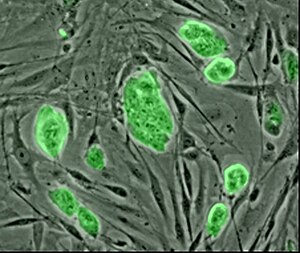 Scientists have invented an efficient way to produce apparently safe alternatives to human embryonic stem cells without destroying embryos, a long-sought step toward bypassing the moral morass surrounding one of the most promising fields in medicine.
Scientists have invented an efficient way to produce apparently safe alternatives to human embryonic stem cells without destroying embryos, a long-sought step toward bypassing the moral morass surrounding one of the most promising fields in medicine.
A team of researchers at the Harvard Stem Cell Institute in Boston published a series of experiments Thursday showing that synthetic biological signals can quickly reprogram ordinary skin cells into entities that appear virtually identical to embryonic stem cells. Moreover, the same strategy can then turn those cells into ones that could be used for transplants.
"This is going to be very exciting to the research community," said Derrick J. Rossi of the Children's Hospital Boston, who led the research published in the journal Cell Stem Cell. "We now have an experimental paradigm for generating patient-specific cells highly efficiently and safely and also taking those cells to clinically useful cell types."
Scientists hope stem cells will lead to cures for diabetes, Alzheimer's disease, spinal cord injuries, heart attacks and many other ailments because they can turn into almost any tissue in the body, potentially providing an invaluable source of cells to replace those damaged by disease or injury. But the cells can only be obtained by destroying days-old embryos.


 A newly discovered species of large dinosaur lived in marshy areas, hunted for fish and had...
A newly discovered species of large dinosaur lived in marshy areas, hunted for fish and had... Scientists may have discovered an explanation for a cosmic mystery uncovered by the James Webb Space...
Scientists may have discovered an explanation for a cosmic mystery uncovered by the James Webb Space... She navigated segregation to become an esteemed mathematician — and today, her work helps billions of...
She navigated segregation to become an esteemed mathematician — and today, her work helps billions of... NASA is cutting short a mission at the International Space Station due to a medical issue...
NASA is cutting short a mission at the International Space Station due to a medical issue...






























